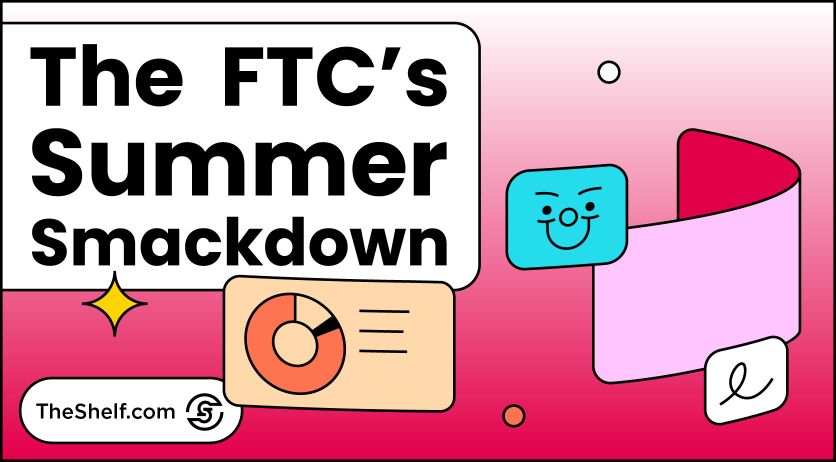We would never say the words, “Told you so” because we’re super classy. Very gracious. Very forgiving. Very take-the-high-road. But with the FTC’s recent ruling against fake reviews and buying social media followers, it’s time for brands and creators to rethink how they approach online endorsements and social proof. The new regulations are a game-changer for businesses that rely on reviews and testimonials to build credibility and drive sales.
So, what does the ruling mean for you, and how can you navigate the new landscape without risking fines or reputational damage? Let’s dive in.
The FTC’s Ruling: What’s New?

On August 14, 2024, the Federal Trade Commission (FTC) announced a final rule that prohibits the sale or purchase of fake reviews, misleading testimonials, and fake social media influence indicators like followers and likes. The rule targets businesses and creators who manipulate public perception through fake endorsements, imposing civil penalties on violators.
Here’s a breakdown of the key aspects of the ruling:
- Fake or AI-generated reviews: Prohibited if they misrepresent a real person’s experience with a product or service.
- Buying or selling positive/negative reviews: It’s illegal to incentivize reviews that express a particular sentiment.
- Insider reviews without disclosure: Companies can’t allow their own employees, agents, or relatives to write reviews without disclosing their connection to the business.
- Suppressing negative reviews: Businesses can’t remove or suppress negative feedback without valid reasons or intimidate customers into silence.
- Fake social media followers/likes: It’s illegal to buy or sell fake social media engagement when it misleads the public about a person or brand’s real influence.
The FTC’s goal is simple: make sure that consumers can trust what they read and see online.
Why This Ruling Matters
We’re no strangers to talking about the ethical laws governing marketing online. Online reviews have a massive influence on purchasing decisions. A whopping 93 percent of consumers read reviews before buying, and 70 percent are more likely to make a purchase based on positive feedback. On the flip side, 78 percent of consumers are less likely to buy if they come across negative reviews. These numbers show how pivotal authentic reviews are to a brand’s success.
The trust consumers place in reviews is now equivalent to personal recommendations for 75 percent of shoppers. However, when reviews are fake, that trust is broken, and the market becomes skewed. The FTC’s ruling is designed to protect consumers from fraudulent practices while ensuring businesses compete fairly.
Implications for Brands
1. Authenticity is Non-Negotiable
The days of inflating your product’s popularity through fake reviews or bots are over. Authenticity is now critical for brands looking to maintain a good reputation. Consumers are savvy, and with this ruling in place, you risk more than just losing trust—you could face serious legal consequences if you’re caught using deceptive practices.
2. Responding to Reviews is Essential
According to the insights, not only do customers rely on reviews to make purchase decisions, but they also pay attention to how businesses respond. Whether it’s a glowing 5-star rating or a scathing 1-star review, actively engaging with feedback builds trust and shows that your brand is transparent. If your business is seen as hiding negative reviews or manipulating ratings, you’ll quickly lose credibility.
3. Invest in Genuine Engagement
Instead of buying fake followers or likes, invest in strategies that build real community engagement. Brands that focus on nurturing authentic relationships with their audience will not only grow sustainably but also avoid penalties under the FTC’s new rules. Consumers can spot fake engagement from a mile away—and now, the FTC is watching too.
4. High-Stakes for High-Price Items
For expensive or unfamiliar products, consumers lean even more heavily on reviews to guide their decision-making. A product with at least five reviews is 270% more likely to be purchased than one with none. High-ticket items especially require trustworthy, genuine feedback. Inflating reviews for these products is not just risky—it’s playing with fire.
Implications for Creators
1. Transparency in Sponsored Content
If you’re an influencer or content creator, this ruling means that your reviews must be genuine, and you need to disclose any relationships with brands. Don’t fall into the trap of sharing overly positive reviews just because you’ve been paid. Consumers—and now the FTC—are looking for authenticity. If your audience suspects you’re being less than honest, you could lose their trust, and brands may face penalties for your fake reviews.
2. Your Reputation is on the Line
Creators thrive on credibility. A reputation built on authenticity can lead to long-term partnerships with brands, while a shady association with fake reviews or inflated follower counts can do lasting damage. It’s more important than ever to carefully choose which brands to work with and to ensure that your endorsements align with FTC guidelines.
3. Engage, Don’t Inflate
Rather than inflating your social media presence with bots or purchased followers, focus on building genuine engagement. While it may take longer, it will pay off in the long run. Brands will want to work with creators who have an authentic following, and consumers will trust you more when they know your influence is real.
Actionable Strategies to Stay Compliant
For Brands:
- Implement Review Monitoring Systems: Use review management tools to track and respond to all reviews, both positive and negative. This not only helps build customer trust but also ensures compliance with the FTC ruling.
- Encourage Authentic Feedback: Request reviews from customers who have genuinely interacted with your product. Avoid offering incentives that require specific feedback, and never buy or sell reviews.
- Train Your Team: Make sure your marketing and customer service teams are aware of the new guidelines and understand the importance of transparency in reviews and endorsements.
For Creators:
- Disclose Relationships: Always be upfront with your audience when you’ve been compensated to review a product. Authenticity and transparency will help you maintain a loyal following.
- Build Real Influence: Focus on creating quality content that resonates with your audience. Engage with your followers and encourage organic growth instead of resorting to buying followers or fake likes.
- Partner with Trustworthy Brands: Choose brands that prioritize transparency and authenticity in their marketing strategies. Avoid working with companies that might be tempted to use unethical tactics.
The Platform Tools That Will Help with Compliance
Each platform—Instagram, TikTok, YouTube, Amazon, and Snapchat—has tools and features to help users remain compliant with the FTC’s ruling against fake reviews and buying followers. These features are designed to promote transparency, authenticity, and proper disclosure. Here’s how these platforms can help brands and creators adhere to the new guidelines:
1. Instagram
- Branded Content Tool: Instagram’s branded content tool requires creators to tag the business they are partnering with, providing a “Paid Partnership” label on posts and Stories. This ensures proper disclosure, making it clear to followers when a post is sponsored.
- Authenticity Checks: Instagram has implemented AI-powered tools to detect and remove fake accounts and engagement (such as likes, follows, and comments). Accounts using fake likes or followers risk being penalized or removed.
- Third-Party Data Access: Instagram restricts third-party apps from artificially inflating follower counts or engagement, helping to prevent businesses or influencers from engaging in dishonest behavior.
- Report Fake Reviews/Accounts: Users can report fake reviews, testimonials, or accounts to Instagram, which will investigate and potentially remove the content or ban the account.
2. TikTok
- Branded Content Disclosure: TikTok requires creators to use the branded content toggle when posting sponsored content. This tool automatically adds a “Sponsored” label to the post, ensuring transparency.
- Fake Engagement Detection: TikTok actively monitors for bots and fake followers, using machine learning algorithms to detect and remove accounts that violate its guidelines.
- Sponsored Content Guidelines: TikTok has detailed guidelines for influencers and brands to ensure they disclose paid partnerships. This includes using appropriate hashtags (#Ad or #Sponsored) and in-app tools to label sponsored content clearly.
- Creator Marketplace: TikTok’s Creator Marketplace allows brands to find creators based on authentic audience engagement metrics, helping brands avoid influencers who might inflate their follower counts with bots or fake accounts.
3. YouTube
- Monetization and Ad Disclosure: YouTube has strict guidelines for sponsored content. Creators must check a box during the upload process if their video contains paid promotions, automatically displaying a disclosure message at the beginning of the video.
- Community Guidelines Against Fake Engagement: YouTube’s algorithms are designed to detect and remove fake views, likes, and subscriptions. If creators or brands are caught buying views or engaging with bots, their accounts could be suspended or demonetized.
- Comment Moderation Tools: YouTube allows creators to filter comments on their videos, which can help manage fake testimonials or misleading endorsements that might be left by bots or spam accounts.
- YouTube BrandConnect: This platform enables brands to partner with creators for sponsored content while ensuring proper disclosure of paid promotions and real engagement metrics.
4. Amazon
- Verified Purchase Reviews: Amazon labels reviews with a “Verified Purchase” badge when the reviewer has bought the product directly from Amazon. This helps consumers identify legitimate reviews versus those potentially incentivized or fake.
- Review Moderation System: Amazon uses AI to detect fake reviews and prevent them from being posted. Reviews deemed suspicious are flagged or removed.
- Community Guidelines: Amazon’s guidelines prohibit incentivized reviews, meaning that sellers can’t offer discounts or products in exchange for positive reviews without proper disclosure.
- Report Review Abuse: Amazon allows users to report reviews that they believe are fake or incentivized. This system helps maintain the integrity of the review system by identifying and removing dishonest reviews.
5. Snapchat
- Sponsored Content Tags: Snapchat requires users to disclose when their content is part of a paid partnership using its “Paid Partnership” tag. This disclosure appears directly on the Snap or Story to make it clear that the content is an advertisement.
- Creator Marketplace: Similar to TikTok, Snapchat’s Creator Marketplace enables brands to connect with creators who offer authentic engagement, making it easier to find influencers with genuine followings.
- Snapchat Ads: The platform’s ad offerings require advertisers to adhere to strict guidelines that promote transparency. Any partnership involving creators must disclose the relationship using proper in-app labels.
Are These Features Enough?
While these features provide a good foundation for compliance, it’s still up to brands and creators to use them properly. Here are additional steps to take:
- Use disclosure tools: Always utilize branded content tags and disclosure tools available on the platform.
- Avoid fake engagement: Don’t purchase followers, likes, or views. Engage with your audience organically.
- Monitor reviews: If you’re a brand selling on platforms like Amazon, keep a close eye on reviews and report any suspicious activity.
- Educate your team and creators: Ensure that everyone involved in your campaigns understands the importance of transparency and complies with the platform’s guidelines.

Conclusion: A New Era of Honest Reviews and Social Proof
The FTC’s crackdown on fake reviews and inflated social media engagement is a wake-up call for brands and creators alike. Authenticity, transparency, and trustworthiness are now the pillars of success in the digital marketplace. By following the new guidelines and investing in real relationships with your audience, you can not only avoid legal trouble but also build a stronger, more credible brand.
It’s time to embrace honesty—because in the long run, it’s what truly sells.





